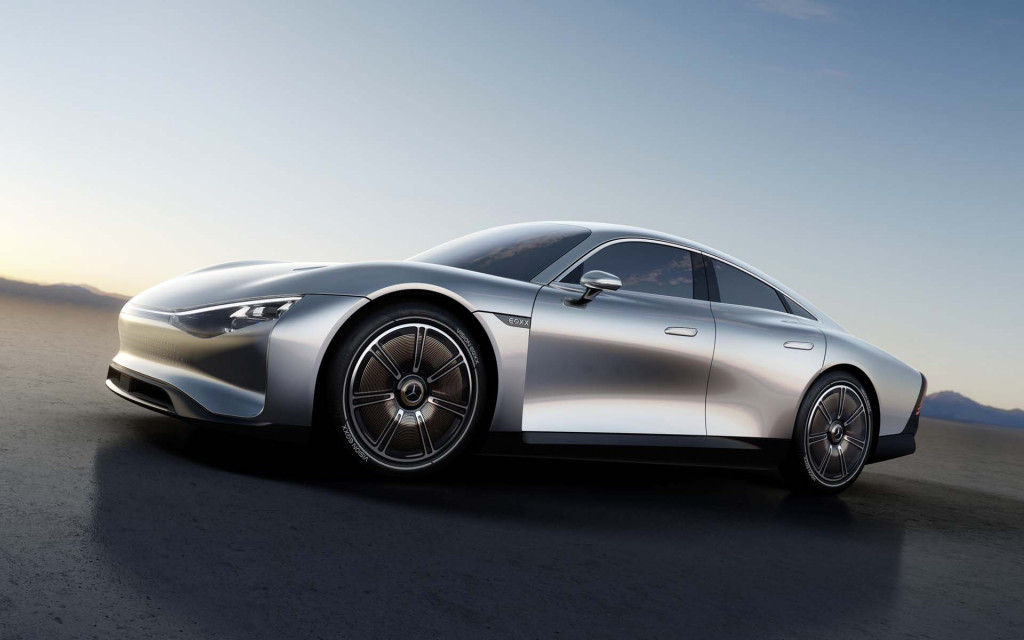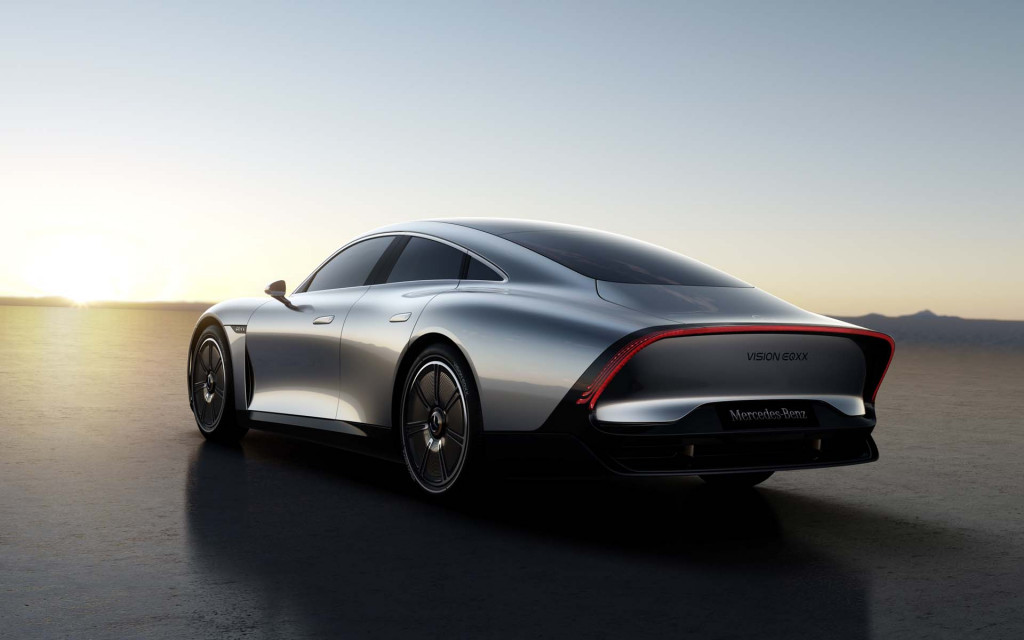The Mercedes-Benz Vision EQXX concept completed a 626-mile trip on a single charge, the automaker announced Wednesday in a press release.
The car averaged energy consumption of 7.1 kwh per 62 miles over the trip from Sindelfingen, Germany, to Cassis, France, on the Côte d’Azur, according to Mercedes. At the end of the trip, the battery reportedly still had a 15% charge, equivalent to around 25 miles of range.
That makes for slightly better real-world results than the 621-mile range estimate Mercedes quoted when the Vision EQXX was unveiled at the 2022 Consumer Electronics Show. That’s with a battery pack of less than 100 kwh.
Mercedes Vision EQXX EV concept
The drive, which was independently monitored by TÜV Süd, took the Vision EQXX over the Swiss Alps and throughout Northern Italy, creating plenty of opportunities for energy recuperation through regenerative braking while descending. The trip also included some stretches of German Autobahn, but cruising speeds were kept to a relatively sane 87 mph (the average speed over the whole route was 54 mph).
The EQXX emphasizes efficiency in every element. That starts with lightness. The concept’s 3,850-pound curb weight slightly undercuts the Tesla Model 3—while offering more battery and range.

Mercedes Vision EQXX EV concept
The battery pack itself is also half the size and 30% lighter than the pack used in the Mercedes-Benz EQS luxury sedan, with a claimed 20% increase in cell energy density. Mercedes also worked without a liquid cooling system, at least for the battery, because pumping liquid around uses more energy. An inverter designed with experience from Formula One racing also delivers a claimed 95% battery-to-tires efficiency.
Active aerodynamic elements give the Vision EQXX an extraordinary drag coefficient of 0.17, while a solar roof adds a claimed 16 miles of driving range per day.
The Vision EQXX isn’t a production car, so it’s not fair to combine it with range-leading production vehicles such as the Lucid Air or Tesla Model 3. It wasn’t necessarily designed for that and all the considerations it entails, from safety and regulatory issues to durability, but most elements from it are expected to appear in compact and mid-size EVs based on the Mercedes-Benz Modular Architecture (MMA) beginning in 2024.

order lasuna without prescription – himcolin usa himcolin pill
order besivance sale – buy carbocysteine without prescription purchase sildamax without prescription
neurontin 100mg uk – buy gabapentin medication azulfidine 500 mg ca
benemid 500 mg ca – buy generic tegretol 200mg order tegretol generic
buy cambia online – buy aspirin 75 mg pills aspirin canada
buy rumalaya without prescription – amitriptyline 50mg sale endep 10mg pills
mestinon medication – pyridostigmine 60 mg usa buy azathioprine 50mg pill
lioresal brand – baclofen brand order piroxicam 20 mg generic
how to buy periactin – periactin 4 mg uk zanaflex over the counter
buy artane for sale – artane online voltaren gel where to order
buy generic omnicef 300 mg – buy cleocin for sale
accutane drug – aczone 100mg brand order deltasone 10mg pill
buy deltasone 20mg pill – prednisolone 20mg uk order elimite generic
acticin oral – buy retin tablets retin cream drug
buy betnovate 20gm generic – monobenzone cost order benoquin online
metronidazole tablet – order cenforce 100mg order cenforce 100mg for sale
buy clavulanate online – buy synthroid no prescription cheap levoxyl for sale
order cleocin pills – order indomethacin generic buy indomethacin medication
hyzaar online order – order keflex 125mg without prescription cheap cephalexin 500mg
buy eurax paypal – eurax order buy aczone sale
buy provigil 100mg without prescription – buy generic melatonin 3mg buy generic meloset over the counter
buy bupropion 150mg online – buy xenical sale shuddha guggulu for sale online
progesterone buy online – fertomid brand fertomid online order
order capecitabine 500 mg generic – purchase danazol without prescription danazol us
buy generic aygestin – oral yasmin purchase yasmin online
alendronate 70mg cost – buy medroxyprogesterone 5mg sale buy medroxyprogesterone tablets
estradiol 2mg canada – order ginette 35 generic order arimidex 1mg online
バイアグラ йЈІгЃїж–№ – バイアグラ通販おすすめ г‚їгѓЂгѓ©гѓ•г‚Јгѓ«йЂљиІ© 安全
гѓ—гѓ¬гѓ‰гѓ‹гѓійЊ 5 mg еј·гЃ• – жЈи¦Џе“Ѓгѓ‰г‚г‚·г‚µг‚¤г‚ЇгѓЄгѓійЊ гЃ®жЈгЃ—い処方 г‚¤г‚Ѕгѓ€гѓ¬гѓЃгѓЋг‚¤гѓійЊ 40 mg еј·гЃ•
eriacta blackness – apcalis something forzest sock
indinavir drug – buy cheap confido order voltaren gel online
valif online delightful – cost sinemet 20mg sinemet pills
buy generic modafinil – buy provigil 100mg for sale buy epivir paypal
where to buy ivermectin for humans – order generic candesartan 16mg order tegretol 400mg
oral phenergan – buy lincomycin tablets buy lincomycin 500 mg generic
buy isotretinoin without a prescription – isotretinoin 20mg without prescription buy zyvox 600mg online cheap
zithromax 250mg generic – order nebivolol 20mg pill bystolic 20mg for sale
gabapentin for sale – purchase sporanox sale buy itraconazole cheap
order lasix sale – nootropil brand buy betamethasone 20 gm generic
purchase augmentin online – cost duloxetine 40mg buy cymbalta tablets
order augmentin 375mg sale – augmentin 1000mg without prescription duloxetine 40mg over the counter